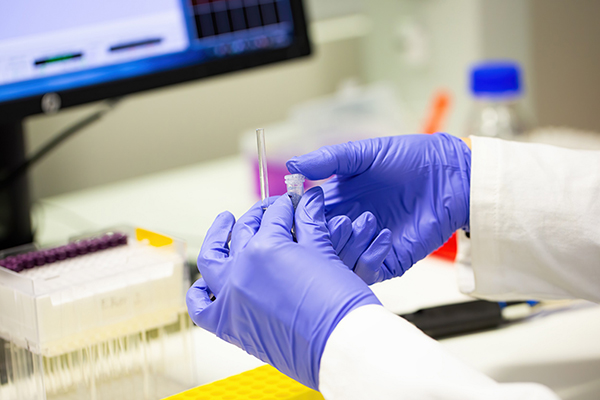Verification for collaboration (VFS in Swedish) is an initiative by Uppsala University to support collaborative research between the University’s researchers and external organisations. Researchers are given the opportunity to team up with companies, public or non-profit organisations to apply for up to SEK 300,000 in order to establish a collaboration on issues of common interest that have the potential to create major benefits for society.
In June, the Vice-Chancellor decided to fund five new projects that had competed for funding in the spring call for proposals. The projects will kick off in the autumn, and represent the University’s breadth of disciplines and the potential to contribute to new and better solutions to significant challenges faced by individuals and society at large.
These are the projects
Improved sampling of forensic evidence in sexual assault cases
Forensic evidence can be crucial in sexual assault cases, and better sampling methods and tools can provide useful DNA profiles in a larger number of cases. How can older forensic samples contribute to such development? The project aims to investigate the effects of long-term storage of DNA from sexual assault cases and to develop a new sampling tool for minimal traces of DNA left through contact, known as touch DNA. The researchers will work with newly created traces, as well as with older materials and traces up to 40 years old.
The opportunity to work with the police on research on samples of different ages and with contact DNA traces opens up entirely new possibilities for researchers to hone methods for both DNA analysis and recovery of large quantities of DNA. This, in turn, will make it possible to solve a larger number of crimes.
Department of Immunology, Genetics and Pathology in collaboration with the Swedish Police Authority in Region Stockholm. Responsible researcher: Marie Allen.
Greater support for lifelong diet-related health
For individuals with intellectual disability, the risk of overweight and obesity is particularly high during the transition to adulthood and the subsequent shift from paediatric to adult healthcare. The project will investigate how dietitians in paediatric habilitation and primary care work with diet-related support for children and young people with intellectual disability. Increased knowledge of working methods and support measures for diet-related health will create the conditions for coordinated and improved care interventions and thus lifelong good health.
Department of Public Health and Caring Sciences in collaboration with the Swedish National Association for People with Intellectual Disability (FUB) and Autism- och Aspergerföreningen Uppsala (AAF Uppsala). Responsible researcher: Päivi Adolfsson.
Development of knowledge and methods to limit the impact of violence on quality of life
The project aims to develop, test and evaluate a programme of practical exercises to boost the inner strength of people affected by domestic violence. The work combines knowledge from several different disciplines, such as psychology, philosophy, social work and pedagogy, with solid practical experience to respond to and support people affected by domestic violence. The programme is intended to complement current working methods by adding a greater focus on strengthening individuals’ own life-affirming powers and potentials, as well as motivation to restore and realise them.
The project aims to contribute to meeting the need for more research on effective interventions that help those affected by domestic violence to re-establish and further develop their own capacities so they can continue moving towards a new, sustainable life situation.
Institute for Housing and Urban Research in collaboration with Uppsala Women’s Shelter and the National Centre for Knowledge on Men’s Violence Against Women. Responsible researcher: Freddie Lymeus.
Growing bacterial cultures studied in new way in fight to save lives
Rapid and optimal antibiotic treatment for patients in need saves lives and combats antibiotic resistance. Getting the right diagnosis and treatment is a battle against time. Automated analysis of microscope images from live bacterial cultures is a powerful tool for visualising bacterial growth. This project will investigate the benefits of using multispectral images in this type of antibiotic sensitivity testing.
The project is expected to show that the use of multispectral microscopy images to quantify bacterial growth patterns may make it possible to determine whether a patient’s bacteria are resistant to a particular treatment more quickly, and distinguish between bacteria of different species earlier and more accurately. Such an outcome is likely to contribute to even better solutions for infection diagnostics as well as to methodological developments in research on e.g. cancer drugs.
Department of Civil and Industrial Engineering in collaboration with Q-linea AB. Responsible researcher: Mats Gustafsson.
Advanced analysis of nanocrystals at the atomic scale for industry and applied solar research
New, improved materials often lay the foundation for major technological advances. A common factor shared by both perovskite (a structural class with many applications) and metal carbides (prevalent in powder steel technology) is that the quality of crystallisation is key to the function of the materials. This is important, for example, in the production of metal tools and solar cells. The project will investigate the mechanism of crystallisation and its impact on size, function and quality, using the Ångström Laboratory’s advanced analytical equipment, such as TEM, XRD and ion beam analysis.
Through increased theoretical knowledge of crystal formation at the nanoscale, 3D printing of powder steel and thin film deposition of perovskites can be controlled to achieve the desired crystal structure and properties. The increased knowledge will lead to reduced energy and material consumption during production and a reduced climate footprint.
Department of Chemistry – Ångström Laboratory in collaboration with Uddeholms AB. Responsible researcher: Malin Johansson.
